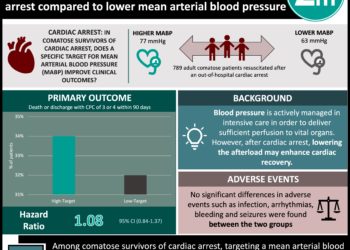Misperceptions about prognosis among surrogates of critically ill patients
1. Discordant expectations about a critically ill patient’s prognosis were common among surrogate decision makers and were due both to a surrogate’s misunderstandings of the physician’s assessment and differences in belief systems.
2. Prognostic estimates by surrogates were significantly more accurate than random chance, but were less accurate than physician estimates.
Evidence Rating Level: 2 (Good)
Study Rundown: Critically ill patients at the end of life are often unable to make their own decisions about medical care. In these instances, family members and loved ones are called upon to act as surrogate decision makers. It has been shown that surrogates tend to be overly optimistic about the patient’s prognosis, which can lead to greater utilization of invasive treatments and delays in palliative care.
This study sought to quantify the degree of discordance among surrogates and physicians about patient prognosis, and to identify the causes of these misperceptions. Among critically ill patients without decision-making capacity, discord was identified in 53% of cases. In most instances, this discord was due to surrogates misunderstanding of the clinical assessment as well as differences in beliefs (i.e., religious beliefs, a patient’s perceived unique strengths, and more). While surrogates were able to estimate a patient’s prognosis better than random guessing, their predictions were not as accurate as a physician’s.
This study, though limited by its use of qualitative data among critically ill patients in a single ICU, indicates that there is a high prevalence of discordance about prognosis between physicians and surrogate decision makers. It follows that to improve agreement—and to potentially improve end-of-life outcomes—physicians should regularly meet with surrogates to explore their clinical understanding and belief system. This study also points to the root causes of discord and suggests possible interventions.
Click to read the study in JAMA
Relevant Reading: Advance directives and outcomes of surrogate decision making before death
In-Depth [prospective cohort]: This study enrolled physicians and surrogate decision makers involved in the care of 174 critically ill patients at a single hospital. Patients who had been in the ICU for 5 days were eligible for this study if they were on mechanical ventilation and had at least a 40% chance of dying as calculated by their APACHE-II score. A total of 229 surrogates and 99 physicians involved in the care of these patients were analyzed. Physicians recorded their prognosis as a probability that the patient would survive their hospitalization. Without conferring, surrogates also indicated their perceived prognosis, as well as their best guess of the physician’s prognosis. Misunderstandings were defined as large differences between a physician’s estimate and a surrogate’s guess at the physician’s estimate. Belief differences were defined as large differences between a surrogate’s prognosis and their guess at the physician’s prognosis. Surrogates were then interviewed about the experience.
Discordance of at least 20% difference in estimated prognosis was evident in 53% of cases (95%CI 46.8% – 59.7%). A majority (53%) of disagreements were due to both misunderstandings and belief differences. While both surrogates and physicians were able to predict prognosis more accurately than by chance alone, physicians were more accurate (c statistic 0.83 vs. 0.74, p = 0.008).
Image: CC/Wiki
©2016 2 Minute Medicine, Inc. All rights reserved. No works may be reproduced without expressed written consent from 2 Minute Medicine, Inc. Inquire about licensing here. No article should be construed as medical advice and is not intended as such by the authors or by 2 Minute Medicine, Inc.









